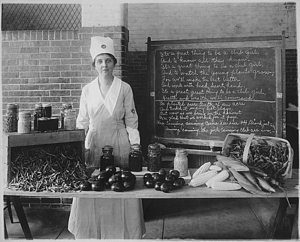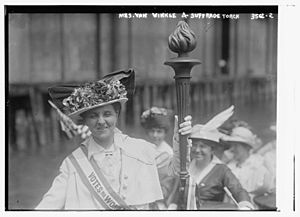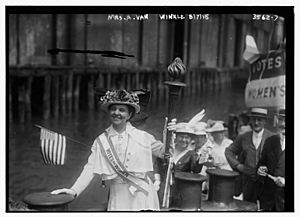Mina Van Winkle facts for kids
Quick facts for kids
Wilhelmina Caroline Ginger Van Winkle
|
|
|---|---|

Van Winkle, in Food Administration uniform, promoting victory gardening in World War I
|
|
| Born |
Wilhelmina Caroline Ginger
March 26, 1875 |
| Died | January 16, 1933 (aged 57) |
| Other names | Mina Van Winkle |
| Education | New York School of Philanthropy (1905) |
| Spouse(s) | Abraham Van Winkle |
Mina Caroline Ginger Van Winkle (March 26, 1875 – January 16, 1933) was a dedicated social worker, a strong supporter of women's right to vote, and a pioneering police lieutenant. From 1919 until her death in 1933, she led the Women's Bureau of the Metropolitan Police Department of the District of Columbia in Washington D.C.. She became a national leader in protecting girls and women during police investigations and court processes.
Contents
Mina Van Winkle's Early Life and Work
Mina Caroline Ginger was born in New York City in 1875. From 1902 to 1905, she worked at Fernwood Home, a special school for girls in Glen Ridge, New Jersey. In 1905, she finished her social work studies at the New York School of Philanthropy.
In 1905, she worked with the National Consumers League. She helped show the difficult conditions faced by young immigrant children from Italy who worked in farm fields in New Jersey.
On October 27, 1906, she married Abraham Van Winkle. He was a wealthy businessman. During their marriage, she continued her social work as a volunteer. Her husband passed away in 1915. She lived in Newark, New Jersey, until about 1917.
Fighting for Women's Right to Vote
In 1908, Mina Van Winkle started a group called the Equality League of Self-Supporting Women of New Jersey. This group was later renamed the Women's Political Union of New Jersey in 1912. She led the New Jersey part of this Union.
During this time, the movement for women's right to vote faced challenges. In 1915, there was an attempt to change New Jersey's constitution to let women vote, but it did not pass. After this, her group joined with another women's suffrage organization.
As the suffrage movement was close to succeeding with the Nineteenth Amendment (which gave women the right to vote), she spoke at the 1920 National Woman's Party convention.
Helping with Food During World War I
Soon after the United States joined World War I, the U.S. Food Administration was created in 1917. Its goal was to encourage people to eat less food and produce more at home. President Woodrow Wilson chose Herbert Hoover to lead it. Hoover then asked Mina Van Winkle to organize and lead its speakers' bureau, which helped spread important messages to the public.
Becoming a Police Lieutenant
In 1916, the Metropolitan Police Department of the District of Columbia started hiring policewomen. In 1918, a special Women's Bureau was created within the police department. By October of that year, Mina Van Winkle was one of its first members. In February 1919, she became the director of the Bureau. She started as a detective sergeant and later became a lieutenant by December 1920.
The Women's Bureau had several important jobs. They focused on helping girls, preventing store crimes, and overseeing places like movie theaters and dance halls. Mina Van Winkle believed that "prevention and protection are more primary than prosecution." This meant she thought helping people avoid trouble and supporting those who made mistakes was more important than just punishing them. Most officers in the Bureau were trained as teachers, nurses, or social workers.
The creation of the Bureau caused some debate in Congress. In 1920, some members of Congress questioned why funds were being used for policewomen. Colonel Charles W. Kutz, a District Commissioner, explained that the law allowed for police officers, and it didn't say they had to be men. During a hearing, Representative George Tinkham, who was against women voting, asked Mina Van Winkle many questions. She famously replied that she did the work "because I have nothing else to do; it is my job in life." In the end, the Bureau kept its funding.
In 1922, Mina Van Winkle faced a charge of not following orders. She refused to release two teenage girls to men who claimed to be their fathers because their identities had not been checked. Her defense in this case was widely reported and brought more attention to the important role of the Women's Bureau within the police department.
From 1919 until her death, she was the president and a main supporter of the International Association of Policewomen.
Later Views
In 1928, Mina Van Winkle shared her thoughts on what makes a good policewoman. She believed that a policewoman "must be a lady." She said they needed to have "innate refinement, innate tact and a finely adjusted sense of values" that come from good early training. This showed her belief that policewomen needed strong character and social skills for their important work.
Death
Mina Van Winkle passed away on January 16, 1933.
Legacy
Mina Van Winkle was a key leader of the International Association of Policewomen from 1919 until her death. The organization stopped for a while after she died, but it was restarted in 1956. It is now known as the International Association of Women Police, continuing her work to support women in law enforcement.
Images for kids
-
Van Winkle, in Food Administration uniform, promoting victory gardening in World War I
 | Emma Amos |
 | Edward Mitchell Bannister |
 | Larry D. Alexander |
 | Ernie Barnes |






